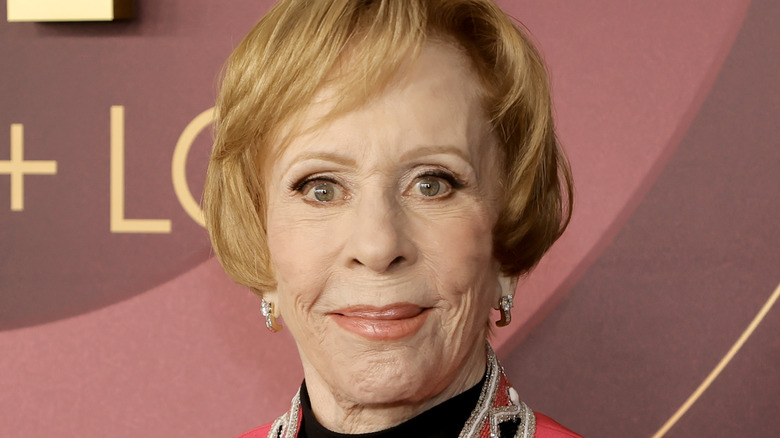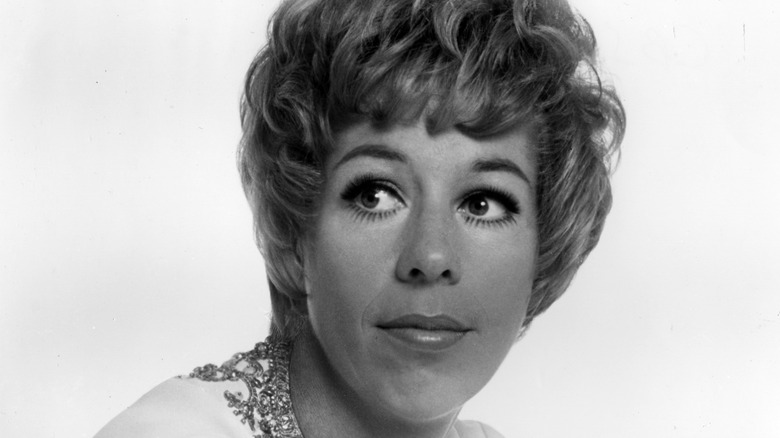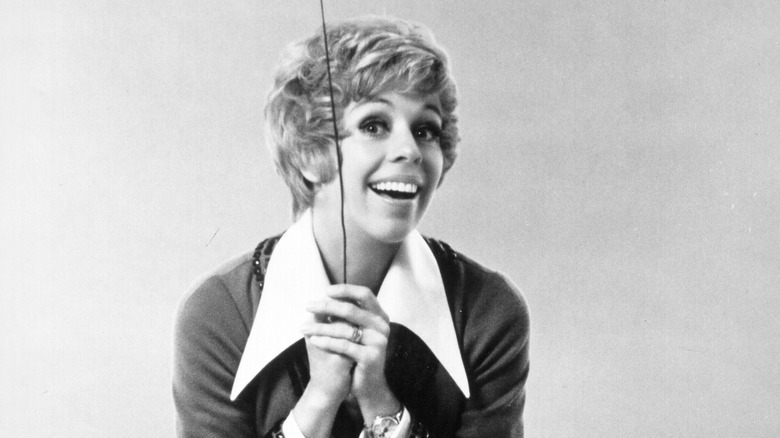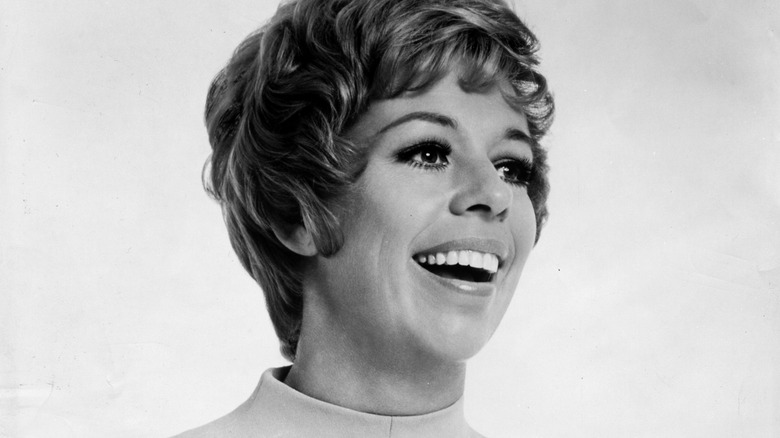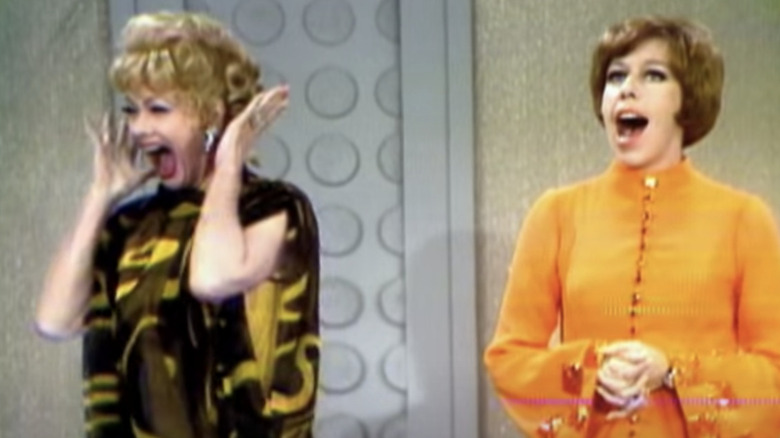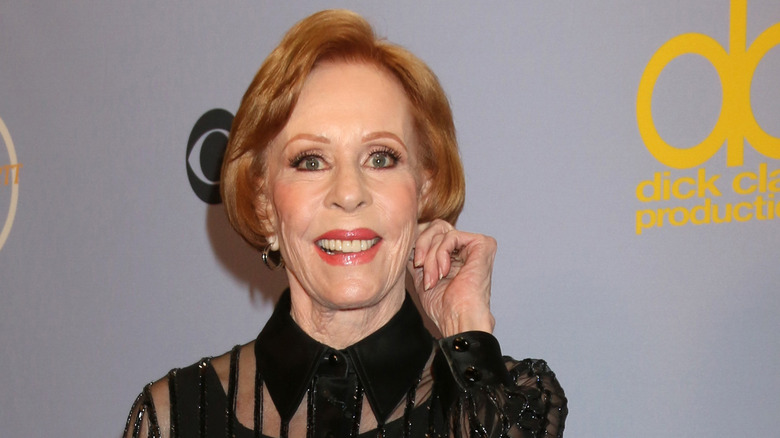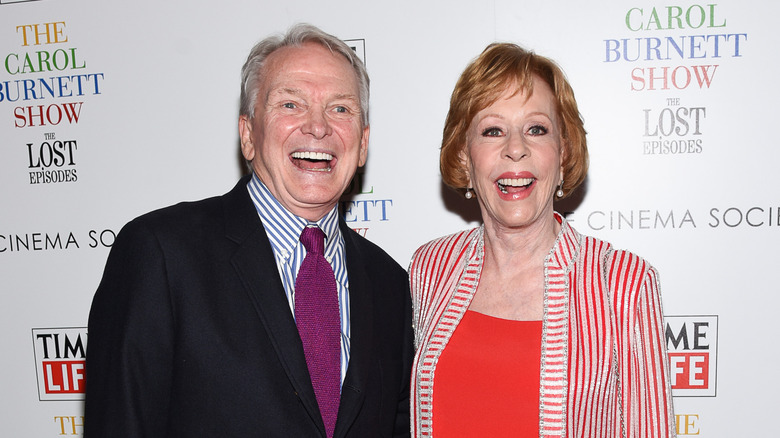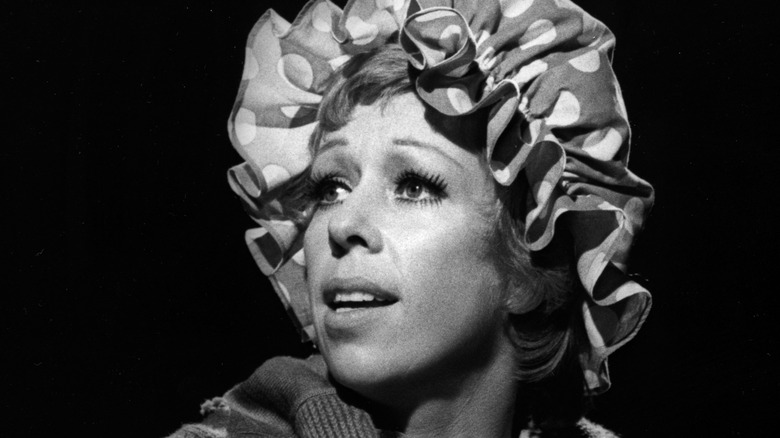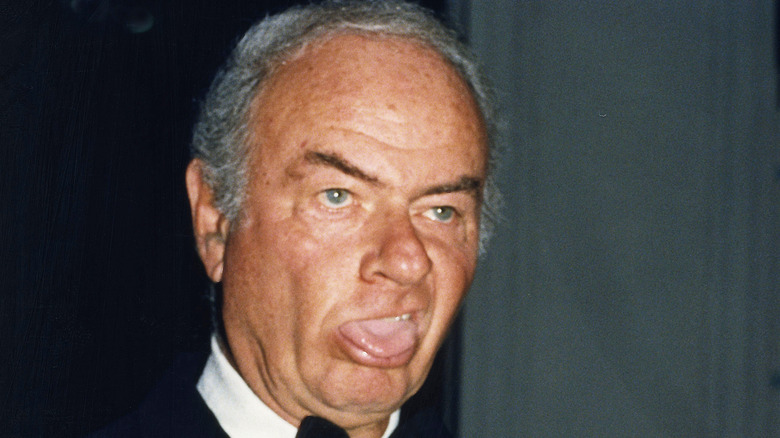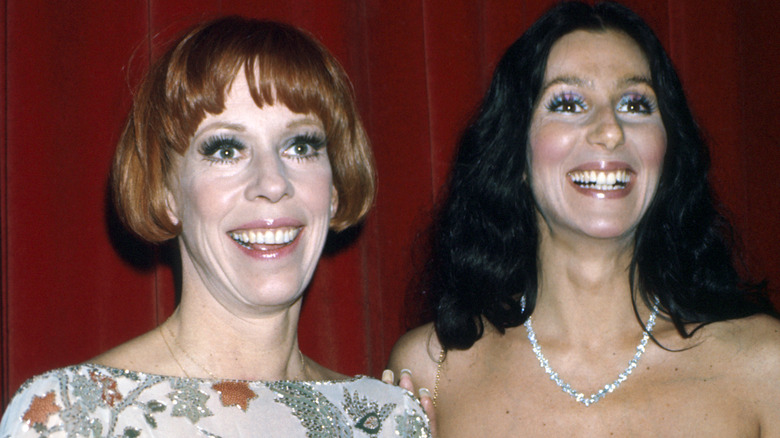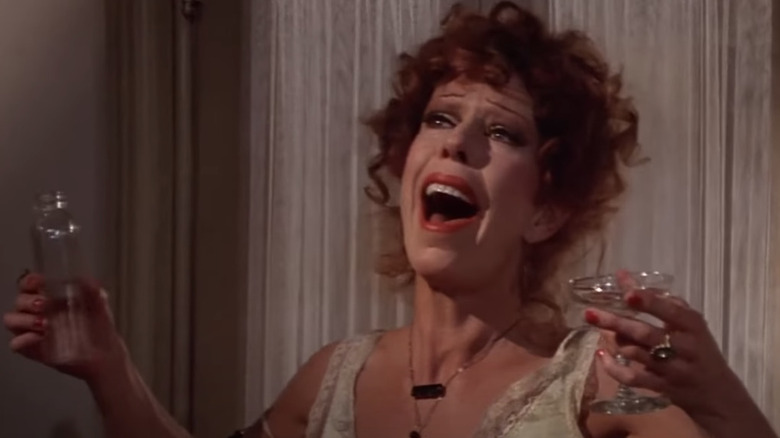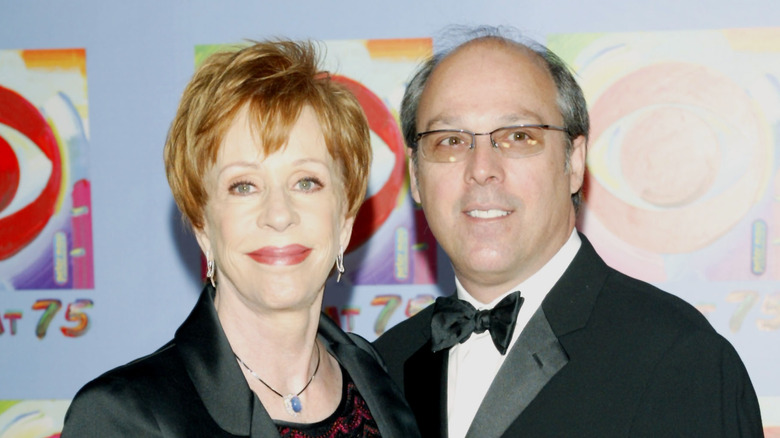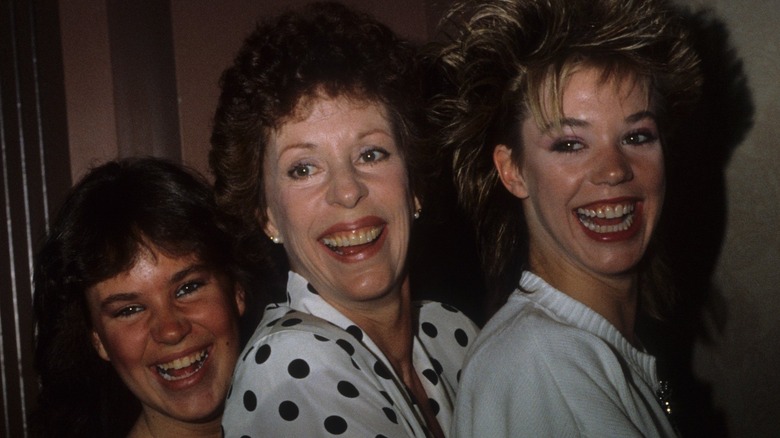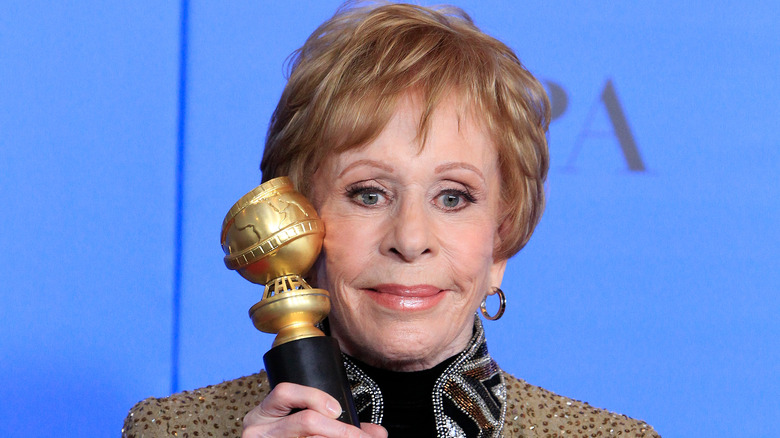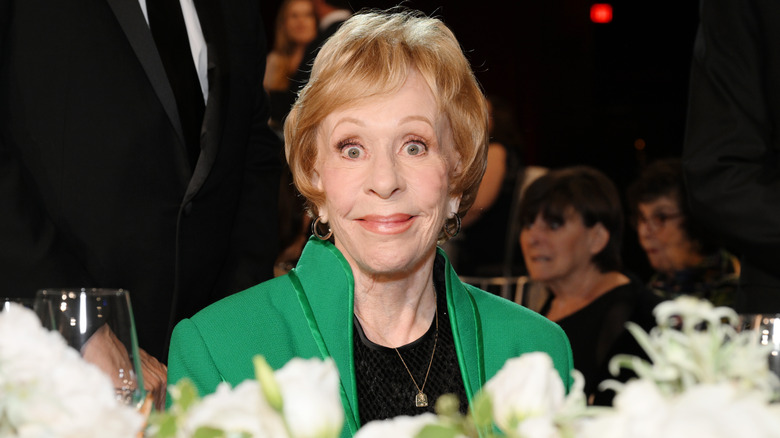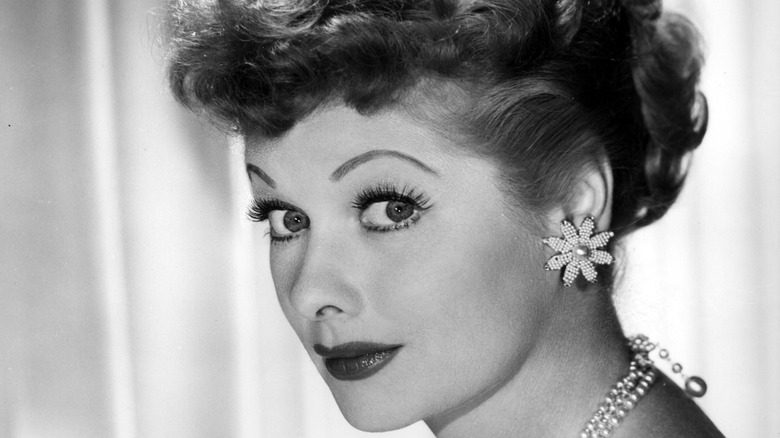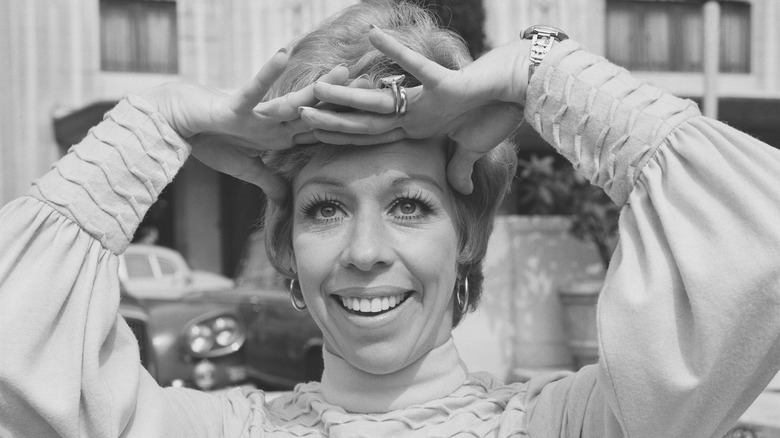16 Facts About Carol Burnett, Hollywood's Legendary Comedienne
Carol Burnett is one of the most beloved and successful comedians of all time. Her self-deprecating humor, slapstick comedy, and fearlessness inspired a generation of other female sketch artists like Tina Fey, Amy Poehler, and Kristen Wiig. Burnett could do it all: sing, act, and write. She has been nominated for 23 Emmy Awards and won six, nominated for a Tony twice, and won six Golden Globes awards. She has received a Peabody, the Mark Twain Prize for American Humor, and received the Presidential Medal of Freedom.
Fans have taken to Burnett for her sense of humor but also for her personal story. She overcame poverty and family dysfunction her entire life. Despite this, she has made it on Broadway and in Hollywood on pure talent — all while remaining a kind and humble person. Burnett has written several books about her personal and professional life. She often speaks in interviews with candor about her family's struggles with addiction, making people feel as if she were the most accessible woman in the world.
Carol Burnett was raised by her grandmother
In 1933, on the tail end of The Great Depression, Carol Burnett was born in San Antonio, Texas, notes Biography. According to her book, "One More Time: A Memoir," "Nanny" and "Goggy," her grandmother and great grandmother, raised her while Burnett's parents chased their dreams of working in the entertainment industry in Hollywood. After their divorce, a young Burnett and Nanny moved to Los Angeles to be with her mother.
Nanny remained Burnett's primary caretaker. Often her parents were drinking and focused on their own careers and personal lives. Both her parents were addicted to alcohol and died in their 40s, according to UPI. Her mother died not long after Burnett took her little sister to live with her in New York, while pursuing her own acting career.
Later, on "The Carol Burnett Show," the writers created a sketch called "The Family," as per Britannica. It was about a dysfunctional family from the South, not too dissimilar from Burnett's. The sketch became the TV show known as "Mama's Family," starring Vicki Lawrence. The character "Mama" was a lot like Nanny in that she was a tough, and at times, eccentric, matriarch. Burnett played the character "Eunice," Mama's daughter. In an interview with UPI, Burnett said, "When I played Eunice, I put a lot of Mama into her ... there was this philosophy of 'if only...' and 'I could have...' and 'I should have...' It was always, 'If this hadn't happened ...' or, to Nanny, 'If you hadn't rained on my dreams ...'"
If you or anyone you know needs help with addiction issues, help is available. Visit the Substance Abuse and Mental Health Services Administration website or contact SAMHSA's National Helpline at 1-800-662-HELP (4357).
She Had Two Mysterious Benefactors
Carol Burnett's mother encouraged her to be a writer. Per NPR, her mother told her, "... because no matter what you look like, you can always write." Though Burnett really wanted to be an actress, she decided to pursue a degree in journalism at UCLA. According to her book, "One More Time: A Memoir," she was accepted though her family could not afford to send her. One day she checked the mail to find an envelope addressed to her containing $50. Enough to register at UCLA.
When she got to UCLA she discovered they did not offer a journalism degree, reports NPR, so she joined the theater department to study playwriting. It was required that she take an acting class. While doing a comedy scene, she got laughs. Burnett told NPR she enjoyed it because she went from being shy and unpopular to getting a lot of attention: "I got cast in a couple of one-acts at UCLA, people on campus would come up, even seniors and graduate students, and say, 'God, we really liked you in that' ..."
Burnett's star power was evident from her first scene. After a performance, a man she refers to only as "Mr. C" asked her about her dreams. She wanted to move to New York to pursue musical theater but didn't have the money. Mr. C said, "So, go to New York." He gave her a check for $1,000 on the condition he paid her back, paid it forward, and never told anyone who he was.
Before becoming a TV star she worked on Broadway
Similar to her college career, Carol Burnett was an instant breakout success, but she struggled to find an agent. According to "Laughing Till It Hurts: The Complete Life and Career of Carol Burnett," by J. Randy Taraborrelli, she decided to create her own showcase with other young actresses. Burnett got 20 calls from interested agents. Vocally, she was interesting enough to get an audition with Rodgers and Hammerstein but realized she needed coaching if she was going to land a job.
To pay for lessons she began working in television. It was the mid-1950s, and TV was just getting off its feet. Burnett, along with auditioning for musicals, began working on camera more often than off. She worked on the "Colgate Comedy Hour," co-starred with Buddy Hackett on a short-lived sitcom called "Stanley," per Biography, and appeared on the Ed Sullivan Show the same night as Elvis Presley (via the show's website). While it helped to pay the bills, it was not what Burnett had set out to do.
Again, she decided to make her own luck. She wrote and sang a song called "I Made a Fool of Myself Over John Foster Dulles." Dulles was, at the time, considered the "most boring man in America," notes PBS. She appeared on late-night shows singing the song and was featured in Life magazine. Her fame brought her a regular spot on the "The Garry Moore Show" and finally, a leading role on Broadway in "Once Upon a Mattress," for which she received a Tony nomination in 1960.
She started doing the Tarzan yell when she was 9
Carol Burnett is famous for her Tarzan yell. When asked about it, she told USA Today the yell began when she was 9 years old. She and her cousin would watch movies and reenact them at home. One time they decided to play Tarzan and Jane. Since Burnett's friend was "beautiful," she was Jane, and Burnett played Tarzan. That seemed to be the crux of Burnett's comedy — that she was willing to be unattractive, loud, and unfeminine at a time when it was considered harmful to a woman's status.
In the biography, "Laughing Till it Hurts," by J. Randy Taraborrelli, Burnett said, "But all but one in a million women are afraid to mess up their hair, not wear lipstick, slouch, look flat-chested. Me? The sloppier I am ... the better I feel in a comedy sketch." From her early days at UCLA, her professors were taken aback by her loudness. When she wanted to shy away from it, people encouraged her to use it, per her memoir, "One More Time."
Burnett did the yell as early as 1962 on the "Jack Benny Show." When she got her own show on CBS, "The Carol Burnett Show," she was often asked to do it in the introduction when speaking with the audience. She told WSJ, she often did it at home to relieve stress. Nowadays she refuses to do it in public, because once at Bergdorf Goodman's in New York she startled a security officer with a gun, per WBUR.
Why Carol Burnett Liked to Tug Her Ear
When Carol Burnett landed her first regular TV gig on "The Paul Winchell Show," Nanny asked that Burnett to say hello to her on camera. According to NPR, Burnett said, "I don't think NBC's going to want me to say, hi, Nanny." So she worked out a signal. She would pull on her left ear and that would mean, "Hi Nanny, I love you" — a tradition she continued on "The Garry Moore Show."
After leaving "The Garry Moore Show," Burnett got offers from all the networks but still couldn't shake the notion being on Broadway was her main goal, as per "Laughing Till It Hurts," by J. Randy Taraborrelli. CBS gave her a contract for five years to decide whether or not she wanted to headline her own variety show. They offered her a deal to produce a special once a year for $1.1 million each. In her specials she co-starred with the likes of Lucille Ball and Julie Andrews.
For the next few years, while Burnett pursued her stage career, Nanny often flew to see her perform on Broadway, watched her on TV, and got to see her when she was in Los Angeles, per NPR. Toward the end of Burnett's five-year waiting period, in 1966, she agreed to do her own show for CBS, "The Carol Burnett Show." A year later Nanny, whose real name was Mae White, died, as Burnett details in her memoir.
Carol Burnett was dressed by Bob Mackie
Burnett was a great collaborator. Her show's success was due to her ability to work with other talented folks such as Harvey Korman, Tim Conway, Vicki Lawerence, and yes, her show's costume designer, Bob Mackie. Mackie's first job in Hollywood was working as Edith Head's assistant, per Vogue. He took the job to be the costume designer for "The Carol Burnett Show" when he was still in his 20s.
Burnett told Vogue that Mackie "did an average of 65 costumes a week. ... he dressed everybody: the dancers, singers, the guest stars, us. He even designed the wigs and how the makeup might be." He often also contributed to the show creatively. Burnett says that at times she'd have a hard time with a character, and Mackie would help it come to life with the right look and minor suggestions, like how to walk in the costume.
The most iconic example of Mackie's contribution to the show was in the sketch, "Went with the Wind," a parody of the film, "Gone with the Wind." It was Mackie's idea Scarlett's iconic dress be literally curtains, rod and all. Upon seeing the dress, Burnett said, "This is going to go down in history as one of the greatest sight gags ever in the history of television" (via Vogue). The dress was given the Barbie treatment and now hangs at the Smithsonian Museum in Washington, D.C.
Did Carol Burnett steal her charwoman character?
Another famous costume from "The Carol Burnett Show" that can be found hanging at the Smithsonian is her "Charwoman" character. Charwoman is an old term to describe a female maid (via Merriam-Webster). It became Carol Burnett's trademark, as seen in the opening credits for her show. According to AP, the character was written for Burnett in her 1963 special, "Carol & Company." It was so emblematic of Burnett, she sued "Family Guy" for using it in an episode, per Reuters.
The original sketch is of a maid cleaning after hours at a burlesque house, per AP. She imagines herself a dancer and pantomimes a strip-tease. According to Burnett, "All I really took off was the sweater and one long glove — I decided there was enough violence on TV." The character became a recurring one on her TV show, closing out every episode with a song as the Charwoman.
According to RaeBourbon.com, a blog dedicated to the life of Ray Bourbon, a vaudeville performer and female impersonator, the character may have been a rip off of Bourbon's "Mop Lady." Bourbon had been doing a similar pantomime as early as the 1930s in Paris and as late as the '60s at the Jewel Box Theater in Kansas City — a time when Burnett also performed in Kansas City. While there were rumors among the locals who knew Bourbon, there was no proof.
Carol Burnett Fired Harvey Korman
Harvey Korman was the "Carol Burnett Show's" "second banana," the person who was funny enough to support Carol Burnett but not overshadow her. When she began creating her ensemble, she said she wanted a Harvey Korman type, per "Laughing Till It Hurts," by J. Randy Taraborrelli. She realized she could just ask Korman. He had just wrapped on "The Danny Kaye Show," when Burnett confronted him in the studio's parking lot to ask in person. According to MeTV, Korman replied, "Would I!"
Korman was previously a dramatic actor starring in Shakespeare plays like Hamlet before falling into comedy. His comedic partnership with Burnett brought him fame and catapulted his film and TV career. He later performed in legendary comedic hits such as "Blazing Saddles," "Mama's Family," and "History of the World Part: I." But by season seven, Burnett had to fire him.
According to "In Such Good Company," by Carol Burnett, she says there was a night during the seventh season when Korman was "rude" to Tim Conway and Petula Clark, two guest stars for the show. She confronted him in his dressing room. He told her he didn't care if he worked on the show again then shut the door in her face. Burnett immediately called his agent and fired him. Korman was apologetic and asked for a second chance. She told him she wanted to see him "cheerful" from now on. The following Monday Korman was smiling, skipping, and whistling to prove he had changed. He stayed on until season 10.
Carol Burnett Almost Quit Her Own Show
In 1972, Carol Burnett began to feel as if the show was growing stale. She seriously considered leaving but hung on, hired new writers, and retired a few characters. Burnett said in an interview with Panorama Magazine in 1980 (via MeTV), "I got more adult about my comedy. ... I just became less dependent on mugging or crossing my eyes to get a laugh." It's a good thing the show remained or viewers would have missed some of its greatest moments. Season six and beyond saw the "Went With the Wind” sketch and "The Family," which later became the series "Mama's Family."
During season 10, Harvey Korman left, as per "Laughing Till It Hurts," by J. Randy Taraborrelli. Again both he and Burnett felt frustrated by the stunted material. Dick Van Dyke was hired to replace him, but it was never the same. The show's ratings began to struggle when it had to compete with "The Love Boat" on Saturday nights. Burnett decided to end the show for good. After 11 seasons, "The Carol Burnett Show" came to a close.
She competed with Bette Midler for the role of Miss Hannigan
After her variety show ended, Carol Burnett began attempting a film career. She starred alongside Ned Betty in the film "Friendly Fire" and then Alan Alda in "Four Seasons." But the role she would become most famous for, aside from her characters on her show, was as Miss Hannigan in the musical film "Annie" in 1982. Initially Jack Nicholson was supposed to play Daddy Warbucks, but later Albert Finny filled the role. As for Miss Hannigan, "It was a toss-up between Bette [Midler] playing the role and Carol," according to Joe Layton, the film's executive producer, in "Laughing Till It Hurts," by J. Randy Taraborrelli. Midler turned it down eventually, and it was awarded to Burnett.
The film was not considered a success. It went over budget and didn't make its money back initially. Hard to believe, considering its enduring love from those who grew up watching it. Critics were harsh too, except when it came to Burnett's performance. Eventually the film made a profit through videocassette sales. Burnett felt bad about it at the time saying, "Any time a film fails it's funny to everybody but the people concerned."
Carol Burnett has been married three times
As "Laughing Till It Hurts," by J. Randy Taraborrelli, details, Carol Burnett met her first husband Don Saroyan at UCLA. He was also an actor, and they dreamed of moving to New York together. When her benefactor gave her a check for $1,000 dollars, he gave Saroyan one too. Not long after they moved, Saroyan's daughter from a previous marriage died in a car crash. Saroyan said, "In all fairness to Carol, what happened didn't make me easy to live with." Burnett was excited to be living in New York and to find success while Saroyan was grief-stricken and coping with his flailing career. The two divorced in 1962.
Her second husband, Joe Hamilton, was a producer on "The Garry Moore Show." He often championed Burnett and mentored her early on. Not long after Burnett left the show, she and Hamilton began dating. They kept their relationship "discreet," as it was the '60s and divorce was frowned upon. The two married in 1963 and had three children together. Hamilton went on to be her producer and champion again on "The Carol Burnett Show." They stayed together for over 20 years, until separating in 1984, according to The New York Times.
In 2001, Burnett married her boyfriend Brian Miller. According to AmoMama, Miller is a musician and 23 years younger than Burnett. The couple are still married as of 2021.
Carol Burnett struggled as a mother and grandmother
Carol Burnett had three daughters, all with Joe Hamilton. According to "Laughing Till It Hurts," by J. Randy Taraborrelli, her daughter, Carrie Hamilton, was addicted to speed, cocaine, mushrooms by age 14. All of this in addition to drinking and smoking pot and cigarettes. For years Burnett battled with her daughter to get sober. After a failed attempt at rehabilitation, Burnett gave Carrie one last chance to get sober before turning 18. It worked.
Burnett's and Carrie's relationship improved. "She got sober and we started bonding. We wound up working together, writing a play together. We worked together in three shows," Burnett told People. Carrie had a career performing in film and TV shows such as the "Fame" and "The X-Files." In 2002, at age 38, she died of lung cancer. Clearly, Carol Burnett has experienced some sad moments in her life.
More recently Burnett's daughter, Erin Hamilton, has been struggling with addiction, according to USA Today. Because of this Burnett and her husband, Brian Miller, sought and won custody of Erin's 14-year-old son. Burnett said, "Guardianship will be for oversight purposes concerning his health, education and welfare and not intended to deny him nor the parents proper visitation with one another."
If you or anyone you know needs help with addiction issues, help is available. Visit the Substance Abuse and Mental Health Services Administration website or contact SAMHSA's National Helpline at 1-800-662-HELP (4357).
There's a Golden Globe award named after her
On December 11, 2018, the Hollywood Foreign Press Association (HFPA) stated that a new special achievement award was created, to be given each year to a recipient to recognize their contributions to the medium. The first honoree of this award was Carol Brunett, whose name was given to the award. Considering how long and influential her career in television was, there are few figures more deserving of having such a major achievement given their namesake than Burnett. HFPA President Meher Tatna highlighted the actress' importance as the reason for picking her, stating: "For more than 50 years, comedy trailblazer Carol Burnett has been breaking barriers while making us laugh. She was the first woman to host a variety sketch show, The Carol Burnett Show. She was also the first woman to win both the Mark Twain Prize for American Humor and Kennedy Center Honors."
Burnett was given the prestigious new award at the 2019 Golden Globes, and she's been followed by other TV icons since for the various ways they've pushed the medium of television forward. Other recipients include Ellen DeGeneres, for her diverse TV career and philanthropy; Norman Lear, for his innovative work on numerous beloved sitcoms; and Ryan Murphy, for his writing, directing, and producing of multiple acclaimed series.
Carol Burnett says she feels like she's 'about 11'
Carol Burnett may be pushing 90, but that's done nothing to temper her youthful personality. The TV legend told People, "I can't wrap my head around it. I still feel like I'm about 11, but I'm amazed. It sure went fast. But I'm glad because I've got all my parts — got my hips, I got my knees and I've got my brain, so I'm happy about that." It may be surprising for most to hear such a statement from someone as old as Burnett, but considering that she's spent decades making people laugh, it makes sense that a part of her will never grow up.
She's certainly maintained her connection to the wonder and humor of children in recent years, which may explain why she doesn't feel as old as she is. Her 2018 series "A Little Help with Carol Burnett" saw her ask children to give advice to adult celebrities like Lisa Kudrow, Wanda Sykes, DJ Khaled, and more. Also, during a red carpet interview at the 2019 Golden Globes, Burnett revealed that she receives fan mail from young people, saying, "I don't answer every letter, but I answer mostly [the ones] from kids. I'm getting fan mail from 10-year-olds! If they leave me a phone number, I'll call 'em."
Lucille Ball was her mentor and close friend
Early in Carol Burnett's career, she moved to New York to become an actress and snagged a role in a production of "Once Upon a Mattress." It was on the show's second night that Burnett would have a fateful meeting, as Lucille Ball (of "I Love Lucy" fame) happened to be in attendance. The TV icon met the young Burnett backstage and the two instantly hit it off, with Ball even telling her to call her if she ever needed a favor.
Burnett would eventually follow up on that offer years later, when she had the chance to perform in a comedy special for CBS. Knowing that getting a major star to make a guest appearance would legitimize her show, Burnett asked Ball if she'd appear, despite her nerves about reaching out to someone so famous. Of course, Burnett's fears were completely unfounded, who recounted the story to a press room at the 2016 Screen Actors Guild Awards, "I said, 'I'm going to be doing this special for CBS and...' She wouldn't even let me finish the sentence and said, 'When do you want me?' And so she was my guest. We became very close friends."
Their friendship lasted for decades, with both comediennes making regular appearances on each other's shows. Every year for Burnett's birthday, she'd receive a bouquet of flowers from the television veteran Ball. Tragically, Ball passed away on Burnett's birthday on April 26, 1989; Burnett still received those flowers.
She was almost talked out of doing a variety show
"The Carol Burnett Show" was such a popular and influential program that it's hard to imagine any studio executive saying no to it. However, that was the case, even after Burnett had more than proven herself as a rising star. Her appearances on "The Garry Moore Show" had boosted her popularity so much that CBS offered her a deal that, as she said on the "Dear Multi-Hyphenate podcast," consisted of "one special a year — an hour-long special a year and two guest appearances on some of their sitcoms." As far as stepping stones go, this was a pretty big one.
However, Burnett was angling for something bigger: her own TV series, but not just any series — she wanted to do a variety show. But this was unheard of at the time; there were plenty of variety shows at the time, yet none of them were hosted by women. Burnett told People that the studio wasn't hot on the idea at first, but she stuck to her guns. "When I got my own show, they tried to talk me out of it to do a sitcom. I said, 'No. I want to do comedy variety.'" She ultimately got her way, showing them that their way of thinking was flawed and outdated. Not only did she become the first woman to host her own variety program, "The Carol Burnett Show" would go on to last for an impressive 11 seasons.
